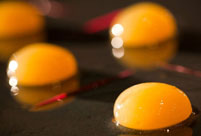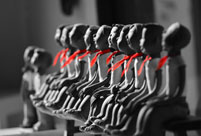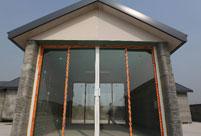 Cherry blossoms reach peak bloom in Washington D.C.
Cherry blossoms reach peak bloom in Washington D.C.
 Top Chinese fashion icons in foreigners' eyes
Top Chinese fashion icons in foreigners' eyes
 Asia's largest business aviation exhibition to be held in Shanghai
Asia's largest business aviation exhibition to be held in Shanghai
 World's top-rated luxury hotels
World's top-rated luxury hotels
 Wu Jing, Xie Nan to hold wedding on May
Wu Jing, Xie Nan to hold wedding on May
 London Cake International attracts tourists
London Cake International attracts tourists
 Let's dance in harmonic Shaanxi
Let's dance in harmonic Shaanxi
 Christie's to auction dazzling diamonds
Christie's to auction dazzling diamonds
 'Model husband' shatters image of love
'Model husband' shatters image of love
 Can animals smile? Or put on a happy face
Can animals smile? Or put on a happy face
NANNING, April 17 -- Food safety is raising eyebrows among the Chinese public once again, after a family-run workshop in east China was exposed to be selling duck blood made with banned additives.
The situation came to the fore when the People's Daily reported on the case on Tuesday. The owners of the mom and pop store in Huai'an City, Jiangsu Province, were found to have added dyeing and printing auxiliaries to the duck blood they sell to make it appear more appealing, the newspaper said on its official account on Sina Weibo, the Chinese equivalent of Twitter.
The couple who own the shop bought chicken blood instead of duck blood at extremely cheap prices, added inedible dyeing and printing agents to make the blood solid, before selling the products to local markets.
Duck blood is a delicacy in China. The small shop made about 1,000 kg of such "duck blood," according to the People's Daily, the flagship newspaper of the Communist Party of China.
The post, which fueled much public unease, has been forwarded more than 5,000 times as of Thursday morning. In a display of their anger, Chinese netizens wrote a flurry of scathing comments about loose government supervision and a dearth of conscience among food manufacturers.
"If people's hearts have become fake, what genuine food can we expect in the market anyway?" wrote a Weibo user with the screen name "Danzengpingcuodedan," in despair of food quality in China.
Another netizen screen-named "Kuailelaoxiaolin" said that authorities should not shirk their responsibilities in the face of such scandals.
China's food safety has been draped in doubts after a slew of high-profile food scandals shook the confidence of consumers, particularly the one in 2008 when melamine-tainted baby formula caused the deaths of at least six infants and made 300,000 ill.
To address widespread concern, Chinese Premier Li Keqiang said in March that the government will strictly enforce food laws and regulations, pledging the most stringent supervision and toughest punishment for unscrupulous producers and negligent officials.
Meanwhile, China's food watchdogs have issued innumerable policies to try to stamp out below-standard food.
According to draft amendments to the Food Safety Law released in late October, China will triple the fines for severe food safety violations, while people jailed for such crimes will be banned forever from the food industry.
But illegal manufacturers continue to stick their necks out to stealthily make unqualified food and rake in more profits.
Earlier this month, a couple in south China's Guangxi Zhuang Autonomous Region were detained by police on suspicion of adding alum, a banned additive, to the salted food they sell.
One of the suspects surnamed Liang said that they jumped on the bandwagon only because "others were doing it," according to local police.
Luo Guoan, a researcher with the sociology department of the Guangxi Academy of Social Sciences, attributed these food scandals to factors including loose supervision, improper management, imperfect laws and regulations, and manufacturers' eroding credibility.
"There is an urgent need to overhaul the whole food industry," Luo said.
One of the major loopholes in the supervision chain is a lack of coordination, he said, pointing out that management of the industry involves many departments, resulting in poor efficiency.
According to Luo, the government needs to ramp up people's awareness of food safety to help crack unqualified edibles in the market.
The researcher said that China should rectify the problem by improving the Food Safety Law, including extending the range of supervision and meting out stiffer penalties to those who violate the law.
"A credibility system should be put in place to regulate the behavior of food makers," he added.
 A bite of China II whets the appetite
A bite of China II whets the appetite Chinese frigate completes its 14th escort mission
Chinese frigate completes its 14th escort mission Let's dance in wealthy Shaanxi
Let's dance in wealthy Shaanxi A date with 798: feel the art around you
A date with 798: feel the art around you 3D-printed houses built in Shanghai
3D-printed houses built in Shanghai World largest scale of umbrella dance
World largest scale of umbrella dance Cherry blossoms reach peak bloom in Washington D.C.
Cherry blossoms reach peak bloom in Washington D.C. Red terraced fields in Dongchuan of Yunnan
Red terraced fields in Dongchuan of Yunnan Presentation ceremony of 33rd Hong Kong Film Awards
Presentation ceremony of 33rd Hong Kong Film Awards The backstage of the Fashion Week
The backstage of the Fashion Week College students in Han costumes
College students in Han costumes Postgraduate works as waitress
Postgraduate works as waitress Life in a Lahu village in Yunnan
Life in a Lahu village in Yunnan An orphan’s wedding
An orphan’s wedding Hollywood documentary brings Diaoyu Islands truth to new audience
Hollywood documentary brings Diaoyu Islands truth to new audienceDay|Week|Month